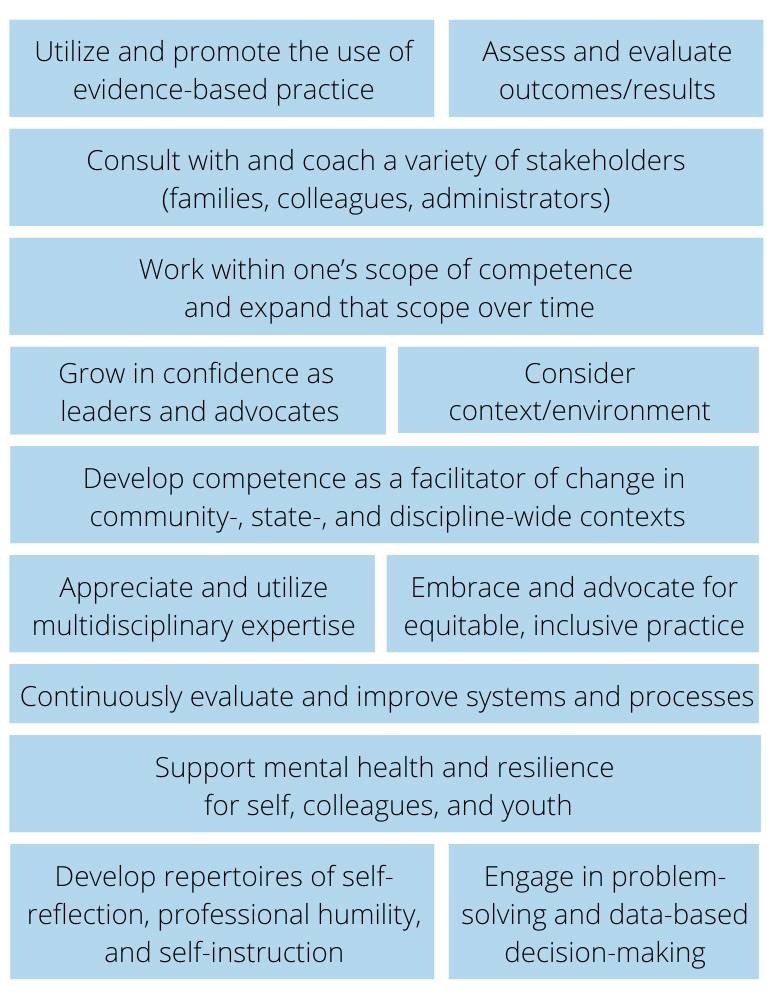School Psychology Graduate Program
School psychologists collaborate with teachers, school administrators, and other school professionals to conduct evaluations and design intervention plans for students who are struggling with a range of academic and behavior problems. Recent legislative and financial shifts in education are driving schools to make significant systemic changes. Because of their training, school psychologists play crucial roles in transforming schools and evaluating outcomes for students, schools, and communities.
Watch program alumni speak about the program and then read more about the distinct aspects of the program at GVSU below.
These program values form the basis of our philosophy of school psychology practice, guide our training model, and inform the work of our alumni.
Our core values:
[1660060956].jpg)
We believe the following:
Assessment, intervention, and prevention are based on empirically-driven practice and a scientific framework to improve outcomes. Our training and work is grounded in a scientist-practitioner model where individuals understand research, effectively share research with others, and implement and evaluate evidence-based practice.
Our first priority is positive student outcomes and supporting those outcomes requires us to understand an individual student’s environment and circumstances. We acknowledge how factors such as culture, race, gender, social class, and ability affect children’s success and we actively promote equitable and inclusive educational practice.
We can positively impact youth in greater, more lasting ways when we improve the broader educational system. We play a crucial role in transforming schools and evaluating outcomes to help schools and communities flourish.
Successful multidisciplinary collaboration within teams builds upon supportive, positive relationships. We engage in problem-solving to address the complex needs of staff, students, families, schools and communities because we understand that effective, sustainable solutions are enhanced by knowledge and experiences beyond our own.
School psychologists strive to expand their scope of competence through self-reflection and engagement in professional growth. Individuals actively use their disciplinary expertise to serve as leaders, to coach and train others in their schools, and to be advocates for positive change in their communities of practice.
Program Structure
Our graduate program in school psychology is a three year, full-time program with a total of 63 credits, including the year 3 internship. Students earn both M.S. and Psy.S. degrees.
The curriculum for the school psychology program is sequenced for each semester, beginning with foundational concepts and moving into more advanced coursework and application of concepts in fieldwork. In addition, students in the school psychology program get extensive training in applied behavior analysis and behavior supports.
Academic preparation includes training in assessment (educational, intellectual, and behavioral), individual and systems interventions, problem solving, applied behavior analysis, and ethical behavior in schools, which will be complemented with over 1800 hours of fieldwork experiences in schools. A background check is required prior to fieldwork in schools.
- Year 1: Students complete coursework and initial practicum hours in classroom settings under the supervision of a local teacher. This practicum experience is arranged by program faculty.
- Year 2: Students complete coursework and 600 practicum hours in school settings under the supervision of a local school psychologist. This practicum experience is arranged by program faculty.
- Year 3: Students complete a 1200-hour internship in a school setting under the supervision of a school psychologist. This internship experience is arranged by students with consultation, support, and approval from program faculty.
Why Study School Psychology at Grand Valley State University?
1. The coursework for the graduate program requires that students participate in coursework and experience that focuses on progressive practices, such as:
- systems-wide prevention
- problem solving
- collaboration & consultation
- data-based decision making

2. Our program is accredited* by the National Association of School Psychologists (NASP) and includes training in skills that are considered important to school administrators:
- data based decision-making
- response to intervention
- functional behavior assessment
- school-wide positive behavior interventions & supports
3. The program provides students with specialized training in behavioral science applied to schools. This training is highly desired by school districts and provides opportunities to consider various job positions beyond a school psychologist (e.g., behavior specialist, autism consultant, positive behavior support coordinator).
4. The program offers the Michigan K-12 School Psychologist Certification and you receive both a master's in science (M.S.) and the psychology specialist (Psy.S.) degree in school psychology. Students can also become a Nationally Certified School Psychologist.
* The program has conditional accreditation February 1, 2026 - February 1, 2028. We are already working closely with the NASP Program Accreditation Board to provide the additional information and data necessary to achieve full accreditation. NASP conditional accreditation and full accreditation both allow a more streamlined process for graduates to become Nationally Certified School Psychologists. The program is still approved by the Michigan Department of Education so graduates are eligible for credentialing in Michigan as a school psychologist. To be eligible for credentialing in states other than Michigan, you can also look at the NASP resource on different state credentials.
Graduates learn to:

